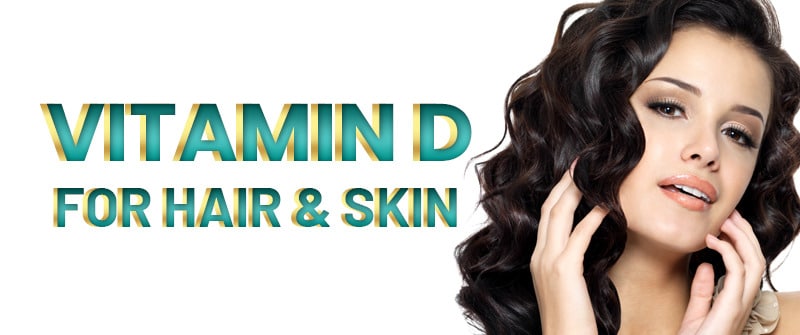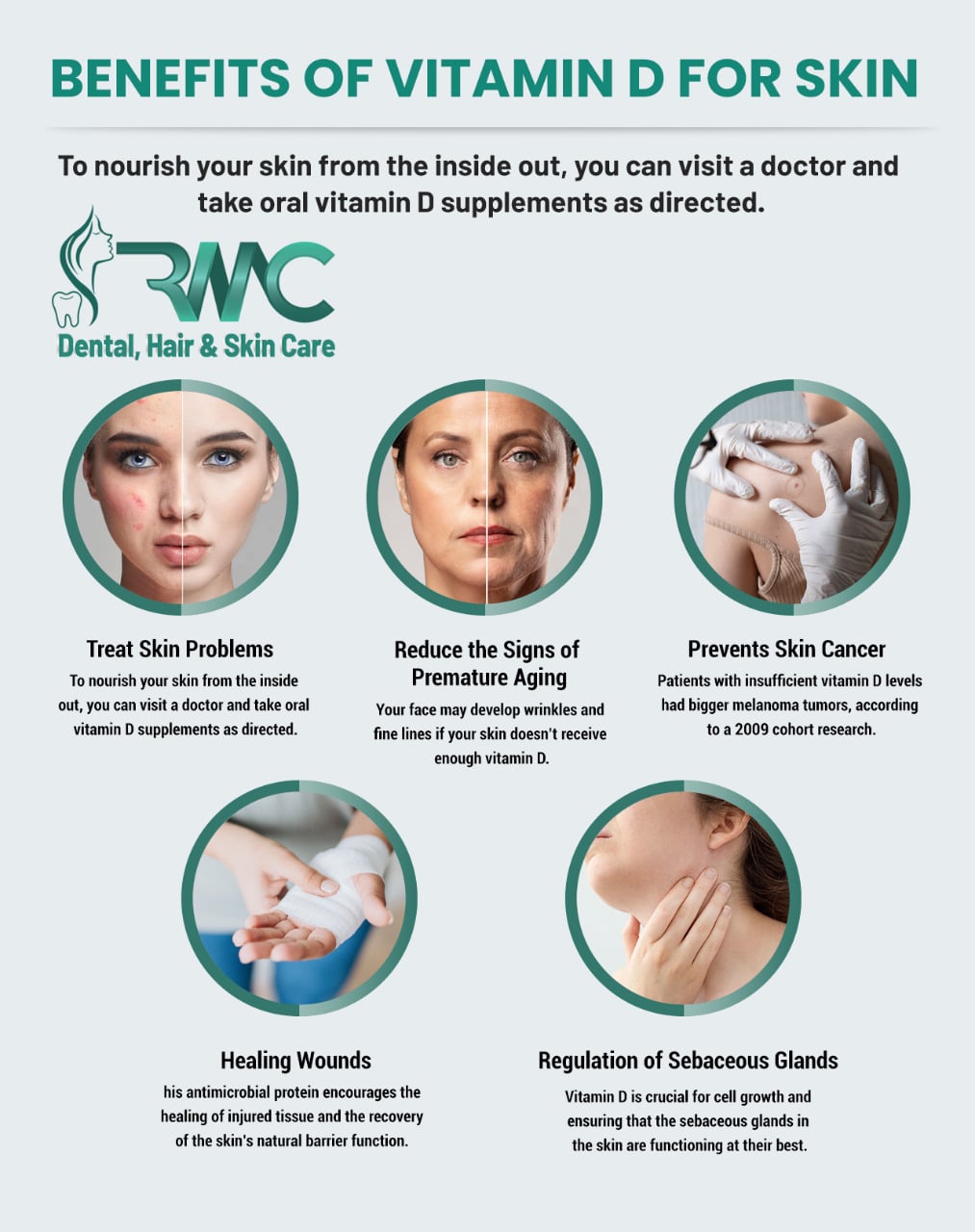
Everybody has heard how vitamins are important for good health, how they strengthen our bodies and immune systems, and how a lack of them can lead to serious illnesses and physical injury. The vitamins you consume have a significant impact on not only your inside organs but also your external physique.
Vitamin D is typically absorbed through sun exposure, but you can increase your intake by taking dietary supplements and eating specific foods.
One of the easily accessible vitamins that are undervalued is vitamin D, generally known as the vitamin of sunshine. However, did you know that this group of vitamins is quite beneficial for your skin and hair? Does it significantly help you in overcoming some of the skin and hair problems we encounter every day?
Continue reading to learn everything you need to know about the sunshine vitamin and all the ways it may help your skin and hair.

What is Vitamin D?
A group of fat-soluble steroids known as vitamin D helps in the processing of various biological processes as well as the absorption of calcium, magnesium, and phosphate.
Vitamin D is actually a vital hormone for our bodies. Vitamin D boosts the bloodstream’s ability to absorb nutrients from the diet.
It is well known that Vitamin D is essential for preserving bone strength and density. Furthermore, this vital vitamin provides several health advantages for our brain, heart, muscles, skin, and hair.
Vitamin D can be taken in two ways: D2 and D3. D2 can be absorbed via the gut through meals and vitamin D3 can be ingested through skin exposure to sunshine.
Therefore, you may simply expose your skin to the sun and increase your intake of foods like oily fish, meat, eggs, and even cheese that are high in vitamin D if you want to raise the level of vitamin D in your body. Vitamin D pills are another option.
However, not everyone requires the same amount of vitamin D. The amount of this nutrient your body needs depends on several factors, including your skin tone, nutrition, where you live, the weather, and even the season.
Benefits of Vitamin D for Skin
Your skin’s top layer may become more vulnerable as a result, increasing your risk of developing dryness, skin discoloration, acne, and infections in general.
In addition to this, a lack of vitamin D can increase insulin sensitivity, which can aggravate acne, result in glycosylated collagen, and hasten the aging of your skin.
To nourish your skin from the inside out, you can visit a doctor and take oral vitamin D supplements as directed.
Below are the main benefits of Vitamin D for your skin. Take a look at them and know about them.
-
Treat Skin Problems
Vitamin D has fantastic anti-inflammatory properties that can help in the treatment of skin issues like dryness, acne, psoriasis, eczema, and vitiligo. This vitamin is used by many cosmetic companies and even dermatologists in night creams and moisturizers.
-
Reduce the Signs of Premature Aging
Your face may develop wrinkles and fine lines if your skin doesn’t receive enough vitamin D. The vitamin’s antioxidants assist in preventing these early aging symptoms and protecting your skin.
-
Prevents Skin Cancer
Exposure to ultraviolet (UV) light is a major environmental risk factor for both melanoma and non-melanoma skin cancers.
According to studies, vitamin D has an anti-proliferative and pro-apoptotic effect on the skin cells that make the pigment melanin.
Patients with insufficient vitamin D levels had bigger melanoma tumors, according to a 2009 cohort research.
-
Healing Wounds
It has been demonstrated that vitamin D increases the expression of the protein cathelicidin. This antimicrobial protein encourages the healing of injured tissue and the recovery of the skin’s natural barrier function. Therefore, it is crucial for the process of healing skin wounds.
-
Regulation of Sebaceous Glands
According to scientific research, vitamin D is crucial for cell growth and ensuring that the sebaceous glands in the skin are functioning at their best. Sebum, a natural oil secreted by the sebaceous glands, forms a layer of defense on the skin’s surface.
Benefits of Vitamin D for Hair
Several of the body’s processes depend on vitamin D, a vital nutrient. According to research, hair loss might result from a vitamin D deficiency. Vitamin D is known for its ability to stimulate both new and old hair follicles. The growth of new hair may be slowed if your body is deficient in vitamin D.
Also, alopecia areata, an autoimmune disorder resulting in patchy hair loss, may be associated with a vitamin D deficiency.
Spending 15 to 20 minutes daily outside is a person’s first defense against vitamin D deficiency-related hair loss.
The best treatment for someone deficient in vitamin D is for them to take vitamin D supplements. Supplemental vitamin D should be consumed with meals, especially those high in healthy fats.
DIY Face Masks to Try
Check out these simple DIY face masks that will do wonders for your skin if you want that vitamin D-enriched, smooth, and glowing skin.
-
Use Egg
One egg, two tablespoons of yogurt, and two tablespoons of ground oats are all you need. Simply combine these ingredients and apply the mixture to your skin. All you need to do is let it sit for 15 to 20 minutes before rinsing it with warm water.
-
Almond Face Mask
Add one tablespoon of almond flour to a small bowl. To the bowl, add 2 tablespoons of gram flour. Add 1/4 teaspoon of turmeric powder after that. Well, assemble all the materials. Then, add water appropriately to create a smooth paste. Apply the mixture evenly now to your face and neck.
-
Use Papaya
The papaya should be minced and mashed. Papaya should be mashed with milk and honey. For a fine paste, mix ingredients well. Use this pack to cover your entire face and neck. For best results, perform this one or two times each week.
DIY Hair Masks to Try
We’ve listed the top DIY hair masks below for all of your greatest problems, including dryness, damage, and an itchy scalp.
-
Use Coconut Oil
Moisturizing frequently will also aid in avoiding breakage, frizz, and split ends. If your regular conditioner isn’t doing the trick, consider an intensive overnight coconut oil treatment.
-
Use Castor Oil
Some hair types are naturally more prone to frizz than others. Use an emollient ingredient like castor oil to coat and seal the hair’s cuticle, or outside layer, to prevent frizz. Castor oil acts as a protectant and can help reinforce strands.
-
Apply Almond Oil
Almond oil is a crucial component if you have a dry scalp because it can keep the skin barrier healthy and hydrated. Since mayonnaise, yogurt, and honey all have anti-inflammatory qualities, people frequently combine them.
Final Thoughts
Numerous aspects of a person’s health and well-being, including hair development, are influenced by vitamin D. People who are vitamin D deficient are more likely to suffer from hair loss and skin issues.
Consult your doctor if you have concerns about vitamin D deficiency related to skin and hair loss. Your doctor may advise taking supplements, making dietary adjustments, and giving you the right instructions.
So, contact Rehman Medical Center and get the best advice from expert doctors.
